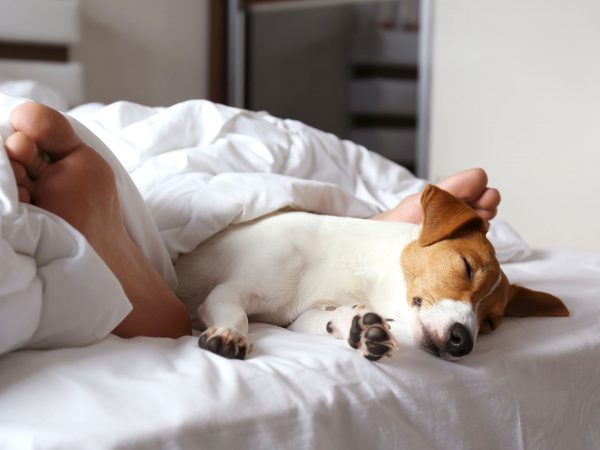Does Sleeping With Your Pet Have Any Health Benefits?
I know that living with a pet is good for me – what about letting the pet sleep in my room, or in my bed?
Andrew Weil, M.D. | July 19, 2022

The benefits of caring for an animal companion are well known – people who share their lives with pets tend to feel less lonely, have better heart health, and enjoy more social interactions than those who don’t. I can personally attest to how fulfilling it is to share my life with dogs. I’m a particular fan of Rhodesian Ridgebacks, which thrive in the Arizona heat, and I know people who swear by other breeds, or by cats, or by any number of other animals who lift our spirits and make our lives richer. Not everyone advocates sleeping with their animals, though, and the research is inconclusive on whether it adds to or detracts from health.
Sharing a bed with anyone – a partner, a child, a sibling, or an animal – can be a mix of comfort and sleep disruption. An investigation of the research published in 2021 in Sleep Health: Journal of the National Sleep Foundation reviewed many studies on all four types of co-sleeping. It found that those who shared a bed reported experiencing better sleep, even though objective measures tended to show that their sleep quality was worse than those who slept alone. The majority of those who slept with their animals said their arrangement did not disturb their sleep, even when data showed otherwise, and said that it provided comfort. The authors concluded that sharing a bed with a pet may provide enough psychological and physiological benefits to offset any negative effects of sleep disturbance.
One paper from the Mayo Clinic reported on a study of 40 adults who shared sleeping space with a dog – either in their room or on their bed. Both human and canine participants wore accelerometers for 7 nights (the dog versions measured only movement; the human version also measured light). Researchers compiled data on sleep onset latency (the amount of time it takes to fall asleep after participants turned out the lights), sleep efficiency (the total sleep time as a percentage of total time in bed), and wakefulness after sleep onset (also called WASO, referring to instances of waking up during the night). That study found that the humans’ sleep onset latency was not affected by where the dog slept but that their sleep efficiency was better, and wakefulness after sleep onset decreased, if the dog was in the room but not on the bed itself. The dogs’ rest was not affected by where they slept.
One online survey of 265 teens who owned animals found that over 78% reported sleeping with their pet, with no difference in sleep quality between those who shared their bed and those who didn’t. (Unfortunately, that was because all of them reported poor quality sleep, regardless of whether or not they slept with their pet.)
There have not yet been enough studies, with a wide enough sample of dogs, to know whether the size or breed of the dog affects sleep hygiene in their humans.
If inviting your pet into your room, or even your bed, gives you comfort and doesn’t make you feel sleep-deprived, there’s probably no reason to stop. I wouldn’t recommend starting the habit as a way of achieving health benefits, but if having your animal companion nearby at night enriches your life, enjoy it. You may also want to read my article on the Health Benefits of Companion Animals.
Andrew Weil, M.D.
Sources
Andre CJ, Lovallo V, Spencer RMC. The effects of bed sharing on sleep: From partners to pets. Sleep Health. 2021 Jun;7(3):314-323. doi: 10.1016/j.sleh.2020.11.011. Epub 2021 Jan 10. PMID: 33436343; PMCID: PMC8205933. https://pubmed.ncbi.nlm.nih.gov/33436343/
Patel SI, Miller BW, Kosiorek HE, Parish JM, Lyng PJ, Krahn LE. The Effect of Dogs on Human Sleep in the Home Sleep Environment. Mayo Clin Proc. 2017 Sep;92(9):1368-1372. doi: 10.1016/j.mayocp.2017.06.014. PMID: 28870354. https://pubmed.ncbi.nlm.nih.gov/28870354/
Rosano J, Howell T, Conduit R, Bennett P. Co-Sleeping between Adolescents and Their Pets May Not Impact Sleep Quality. Clocks Sleep. 2021 Jan 4;3(1):1-11. doi: 10.3390/clockssleep3010001. PMID: 33406702; PMCID: PMC7838871. https://pubmed.ncbi.nlm.nih.gov/33406702/











